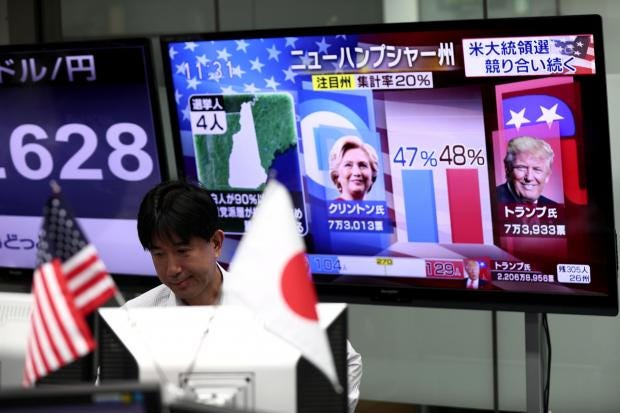The election of President Trump is seeing a huge sell-off of
dollar assets against almost everything else except the Mexican peso.
And remember it's not just the American currency; it's the world
currency. If a Trump presidency destabilises the dollar then it will
destabilise the entire global economy

Problem is that the dollar isn’t just the American currency, it’s the world currency. Financial regulators all over the world require banks to hold government bonds in reserve, and the biggest stock of such stocks in the world are issued by the United States Treasury. The same goes for pensions regulators. The same goes for insurers. The same goes for the instincts of savers and investors everywhere. If a Trump presidency destabilises the dollar then it will destabilise, by definition, the entire global economy.
Hence the sell-off in shares that is already happening. With the Nikkei down about 6 per cent, the Hang Seng down 3 per cent and the London market looking to start about 4 per cent down. By contrast gold, that safest of safe havens, is up to $1,300 again. One of the few brighter spots is that oil is a little weaker, though that is more a verdict on the suddenly more dismal prospects for global growth and the demand for commodities than some guarded relief that Hillary Clinton won’t be around to confront President Putin. Businesses, and markets, as we learnt post-Brexit, hate uncertainty, and what The Donald will do is, as yet, extremely uncertain.
Obviously we do not know exactly what President Trump will do to the economy, but there have been some unsettling signs. He is unashamedly protectionist, and will tear up existing free trade agreements, such as Nafta, as well as abandoning other putative deals across the Pacific to East Asia and across the Atlantic with the European Union.
There is some scant hope for the British that a Trump administration would be well-disposed to an arrangement with the UK, but the chances are that it wouldn’t be as generous towards Britain as Theresa May and her colleagues might wish. Donald Trump seems sentimental about Britain, but that won’t be enough. If there are American jobs at stake, then International Trade Secretary Liam Fox and British ministers can forget it. If improving international trade boost global growth, then the opposite is also true, and is very bad news for the world in the longer run. He may or may not make America great again, but he will not do much for the world’s prosperity.
The man who prides himself on his ability to do a deal has previously indicated that he wants to start buying back US government debt at some kind of discount, which is not reassuring for those investors and financial institutions around the world that hold such paper. It would effectively be a kind of pre-default default on US Treasury bonds. We haven’t heard so much about that Trump debt buy-back plan since the summer, but what we do know is that Trump will certainly push the US government deficit higher in the short run, driven by tax cuts and higher defence spending.
If America and the world is lucky, that will unleash some kind of entrepreneurial revolution and drive American growth higher. If we are less lucky then it will simply test the world’s faith in the dollar, and weaken the currency. Trump has also made little secret of his frustration with Janet Yellen and the way the Federal Reserve has been running things - an unwonted political interference with a traditionally independent central bank. That could lead to a dangerous chain reaction.
Almost a decade ago, when the financial crisis broke, people talked about a “black swan” event – an unknown unknown that no-one can foresee. Well, that wasn’t true about the trump surge, and we also already know where the weakest links in the global economy are. China’s banks are already reportedly under some strain, and they, and China more broadly, are sitting on a vast pile of US government debt – some $1.3 trillion. There’s plenty more than that in other dollar-denominated bonds issued by supposedly safe and stable US companies. If that starts to wobble then the consequences would be grim.
And here’s the real problem. During the financial crisis and the Great Recession that followed it, and the feeble recovery since, the US has acted as lender of last resort to the world. If America cannot, or will not, any longer perform that role, then the world economy really is exposed to a Trump Slump as bad as anything we have seen since the 1930s.
If Brexit and Trump are followed by similarly disruptive election results in Germany and France, then the world is in for a great deal more instability. From President Trump, and all that follows from him, we should hope for the best – and prepare, if we can, for the worst.
No comments:
Post a Comment